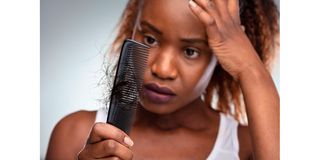Experiencing hair loss? Read this before you go for supplements

Experiencing hair loss? Read this before you go for supplements. Photo | Photosearch
What you need to know:
multivitamins often have high concentrations of folic acid (sometimes much higher than the quantity the body needs). This can lead to elevated red cell folic acid concentrations, which can prove detrimental to the healthy growth of hair.
Today’s story is about Lilac, a 35-year-old mother of two. Lilac came to see me because she had been losing hair for four months and no-one could tell her why. Lilac had already been through menopause and her thyroid test came back normal – both potential causes of hair loss.
But it wasn’t just the hair loss that worried Lilac; it was also the tingling in her scalp. It’d be there when she woke up and intermittently throughout the day. Her uncle had diabetes, so she knew that any sort of tingling might mean nerve damage. So Lilac next went to a neurologist and, after a battery of tests, was still no closer to finding an answer. They’d even tested her for lupus, a condition where the body's immune system starts to attack its own tissue.
This is when she came to see me. I explained that the tingling she felt on her scalp was called Scalp Dysesthesia or burning scalp syndrome. In short, it meant that a high number of her hair follicles were entering the telogen phase of hair growth.
Let me explain. Each of our hair follicles goes through a cycle. There is a longish period where it grows and a short period of rest, where the hair is still attached to the hair follicle, but doesn’t grow. After the resting phase, the hair is shed and a new hair begins to grow, thereby starting a new hair growth cycle (since our hair follicles are all at different stages, we don’t ever see any noticeable bald spots).
This ‘rest’ period is called the telogen phase, and it’s also calling called the ‘shedding’ phase - exactly what Lilac was experiencing. It appears that women (and men) who are in the early to mid stages of losing hair experience this burning sensation and it only disappears once the hair loss stabilises.
So why were the follicles to go into this telogen phase? First, let me give this condition a name: telogen effluvium - a condition where some sort of shock to your system causes hair roots to be pushed prematurely into the resting state. When I say shock, I mean either emotional or physical trauma, whether it’s a death in the family, surgery, sudden or excessive weight loss, or serious nutritional deficiencies. In Lilac’s case, it was the death of her older brother nine months prior. You see, when the body experiences a period of profound stress, hair production simply shuts down.
Therefore, aside from coming to terms with the grief, there were two things that Lilac had to do. The first was to get her iron levels checked (low iron levels can contribute to hair loss). She had already done a ‘serum iron’ test (which came back normal), but I wanted her to check her ‘ferritin’ levels, which gives a better idea of a person’s iron stores in the body. As I expected, iron levels were indeed low and iron supplementation (along with other supporting nutrients) was required.
I also asked her to stop taking the various nutritional supplements she took to help her hair – they was having the exact opposite effect that she wanted it to. What a lot of people don’t realise is that excessive supplement intake, particularly the intake of vitamin A, other fat-soluble vitamins and trace elements, can actually cause hair loss. For example, multivitamins often have high concentrations of folic acid (sometimes much higher than the quantity the body needs). This can lead to elevated red cell folic acid concentrations, which can prove detrimental to the healthy growth of hair.




